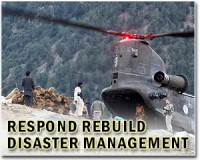 |
Waco TX (SPX) Jan 17, 2011 New results from a Baylor University study show that different behaviors and strategies lead some families to cope better and emerge stronger after a weather-related event. Dr. Sara Alexander, an applied social anthropologist at Baylor who conducts much of her research in Central America, studied different households in several coastal communities in Belize. While climate change has been an emerging topic of interest to the world community, little scientific data exists on exactly how people respond to different climate-related "shocks" and events such as more intense hurricanes and prolonged drought. Using a livelihood security approach, Alexander and her team identified vulnerable households in these communities and examined how they adapted and coped with major climate events and shocks such as droughts, hurricanes and floods. The Baylor researchers also developed tools to measure each household's long-term resilience, an area that has not been extensively researched, and identified specific behaviors and strategies that allowed some families to "weather the storm" better than others. The results indicate: + Sixty-two percent of vulnerable households made the assertion that chronic weather-related threats such as floods and prolonged drought are a greater concern than "one-off" disasters like hurricanes. + Perception about climate change and weather patterns played a key role in determining whether a household prepares adequately for a harsh weather event. For instance, 57 percent of households believed that storms today are more intense than they were five to 10 years ago, the household is more likely to prepare when weather forecasters predict threatening weather. + Vulnerable and more secure households differ in coping strategies when dealing with weather-related events. Forty-nine percent of vulnerable households turn to their faith, 43 percent to their family, and 36 percent turned to their friends for emotional support. Only 19 percent turned to financially-based responses and only 8 percent made attempts to secure credit to gain resources to make repairs rebuild. Households that have the highest levels of security are more likely to use their savings or sell their assets to engage in a financially based response by repairing and rebuilding, many times finding emotional support through this work. + A critical ingredient for reducing vulnerability and enhancing resilience is empowerment of marginalized groups and the associated access to resources. + Although the capacity of households to adapt to harsh weather is a function of perception of risk and access to resources, resilience of communities depends on the ability of people to think and act collectively. "The results suggest that both vulnerable and secure households respond to weather-related events, but they do so in different ways," said Alexander, associate professor and chair of the department of anthropology, forensic science and archaeology at Baylor's College of Arts and Sciences. The results will be published in the journal Climatic Change and Mitigation and Adaptation Strategies for Global Change. Alexander said over the last 150 years, data shows surface temperatures have increased and the associated impacts on biological and physical systems have become more evident. Some of the more notable changes that have gradually occurred are sea level rise, shifts in climatic zones, changes in precipitation patterns and increases in frequency and magnitude of extreme weather events like droughts, floods and storms. Alexander said she has always maintained that by definition, more vulnerable households are not able to respond as effectively to a natural disaster as those households whose livelihoods are more secure, that is, their capacity for response is influenced by their weakened ability to guard against risk. Alexander and her team developed a resilience-measuring index for human responses that examined certain long-term security indicators, including economic stability, human health conditions, adult education levels, social connectedness, environmental health, and food and nutrition security. The researchers then tracked those indicators as different weather-related events naturally occurred. The project was funded through a $235,000 grant from the National Oceanic and Atmospheric Administration (NOAA). Also collaborating on the project as a co-investigator is Dr. Susan Stonich, professor of anthropology and environmental studies at the University of California, Santa Barbara.
Share This Article With Planet Earth
Related Links Baylor University Bringing Order To A World Of Disasters A world of storm and tempest When the Earth Quakes
 Struggling Haiti faces crucial week in politics
Struggling Haiti faces crucial week in politicsPort-Au-Prince (AFP) Jan 16, 2011 The tears have barely dried from Haiti's earthquake anniversary and now the deeply troubled Caribbean country faces the urgent task this week of defusing an explosive election crisis. Sunday was supposed to have been the day Haitians voted in a runoff to chose a new president to lead them through the most challenging period in their history. However, the runoff was postponed after the fi ... read more |
|
| The content herein, unless otherwise known to be public domain, are Copyright 1995-2010 - SpaceDaily. AFP and UPI Wire Stories are copyright Agence France-Presse and United Press International. ESA Portal Reports are copyright European Space Agency. All NASA sourced material is public domain. Additional copyrights may apply in whole or part to other bona fide parties. Advertising does not imply endorsement,agreement or approval of any opinions, statements or information provided by SpaceDaily on any Web page published or hosted by SpaceDaily. Privacy Statement |